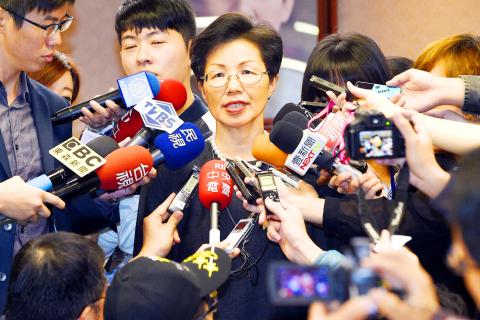Mainland Affairs Council (MAC) Minister Katharine Chang (張小月) yesterday said that the council is working on a new cross-strait policy to replace the so-called “1992 consensus” as part of its efforts to overcome the impasse across the Taiwan Strait.
Chang made the remarks during a meeting of the legislature’s Internal Administration Committee in Taipei, which was held to review the council’s budget proposal for the next fiscal year.
At the meeting, People First Party Legislator Chen Yi-chieh (陳怡潔) asked Chang to comment on remarks by Chinese Academy of Social Sciences Institute of Taiwan Studies head Zhou Zhihuai (周志懷) at an academic forum in China’s Guangxi Province on Nov. 30 that Beijing “does not oppose the idea of the 1992 consensus being substituted by a creative alternative.”

Photo: Chen Chih-chu, Taipei Times
“Do you interpret such comments as a gesture extending an olive branch? What is the council’s attitude about this?” Chen asked.
Chang said the council holds a positive view of Zhou’s remarks, but believes that only a mindset of “seeking common ground, while maintaining differences” would be conducive to cross-strait development.
“The council will positively and discreetly study [any proposals that can] promote cross-strait development. We are willing to sit down with Beijing at an opportune time to work out a solution,” Chang said.
She added that the council has been studying possible alternatives to the “1992 consensus.”
Cross-strait communication mechanisms have been suspended due to President Tsai Ing-wen’s (蔡英文) refusal to acknowledge the “1992 consensus,” which refers to a tacit understanding between the Chinese Nationalist Party (KMT) and the Chinese Communist Party that both sides of the Taiwan Strait acknowledge that there is “one China,” with each side having its own interpretation of what “China” means.
Former MAC chairman Su Chi (蘇起) said in 2006 that he had made up the term in 2000.
On the sidelines of the meeting, Chang said any forms of threat are not helpful to cross-strait ties, in response to reporters’ questions about Chinese air force missions circling Taiwan’s airspace on Nov. 25 and Dec. 10.
“[Beijing] has always adopted a stick-and-carrot approach to Taiwan. There is no type of threat that has a positive effect on cross-strait relations. Our stance is that we should maintain cross-strait peace and stability,” Chang said.

INVESTIGATION: The case is the latest instance of a DPP figure being implicated in an espionage network accused of allegedly leaking information to Chinese intelligence Democratic Progressive Party (DPP) member Ho Jen-chieh (何仁傑) was detained and held incommunicado yesterday on suspicion of spying for China during his tenure as assistant to then-minister of foreign affairs Joseph Wu (吳釗燮). The Taipei District Prosecutors’ Office said Ho was implicated during its investigation into alleged spying activities by former Presidential Office consultant Wu Shang-yu (吳尚雨). Prosecutors said there is reason to believe Ho breached the National Security Act (國家安全法) by leaking classified Ministry of Foreign Affairs information to Chinese intelligence. Following interrogation, prosecutors petitioned the Taipei District Court to detain Ho, citing concerns over potential collusion or tampering of evidence. The

Seventy percent of middle and elementary schools now conduct English classes entirely in English, the Ministry of Education said, as it encourages schools nationwide to adopt this practice Minister of Education (MOE) Cheng Ying-yao (鄭英耀) is scheduled to present a report on the government’s bilingual education policy to the Legislative Yuan’s Education and Culture Committee today. The report would outline strategies aimed at expanding access to education, reducing regional disparities and improving talent cultivation. Implementation of bilingual education policies has varied across local governments, occasionally drawing public criticism. For example, some schools have required teachers of non-English subjects to pass English proficiency

‘FORM OF PROTEST’: The German Institute Taipei said it was ‘shocked’ to see Nazi symbolism used in connection with political aims as it condemned the incident Sung Chien-liang (宋建樑), who led efforts to recall Democratic Progressive Party (DPP) Legislator Lee Kun-cheng (李坤城), was released on bail of NT$80,000 yesterday amid an outcry over a Nazi armband he wore to questioning the night before. Sung arrived at the New Taipei City District Prosecutors’ Office for questioning in a recall petition forgery case on Tuesday night wearing a red armband bearing a swastika, carrying a copy of Adolf Hitler’s Mein Kampf and giving a Nazi salute. Sung left the building at 1:15am without the armband and apparently covering the book with a coat. This is a serious international scandal and Chinese

TRADE: The premier pledged safeguards on ‘Made in Taiwan’ labeling, anti-dumping measures and stricter export controls to strengthen its position in trade talks Products labeled “made in Taiwan” must be genuinely made in Taiwan, Premier Cho Jung-tai (卓榮泰) said yesterday, vowing to enforce strict safeguards against “origin laundering” and initiate anti-dumping investigations to prevent China dumping its products in Taiwan. Cho made the remarks in a discussion session with representatives from industries in Kaohsiung. In response to the US government’s recent announcement of “reciprocal” tariffs on its trading partners, President William Lai (賴清德) and Cho last week began a series of consultations with industry leaders nationwide to gather feedback and address concerns. Taiwanese and US officials held a videoconference on Friday evening to discuss the